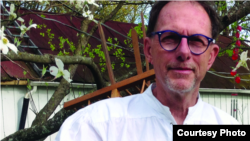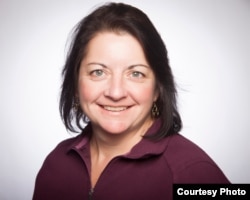How much can walking really teach you? Can you learn enough from walking to make an entire college class about it?
Kenneth Keffer thinks you can, and he should know. Keffer has been teaching a class called the ‘Art of Walking’ at Centre College since 2002.
Centre College is a private liberal arts college in Danville, Kentucky. In 2018, the school will offer the class for credit for about the thirteenth time.
Liberal arts education has been an important tradition in American higher education for hundreds of years. It aims to provide students with a wider understanding of the world and help them understand how different fields are connected.
In addition to a main subject of study, liberal arts programs require students to take other classes in related and, sometime unrelated, subjects.
Centre College is not the only university in the United States that offers such unusual sounding classes.
For example, George Washington University in Washington, DC offered a class called ‘Japanese Swordsmanship’ in 2014. In 2013, Oberlin College in Oberlin, Ohio offered a class called ‘How to Win a Beauty Pageant.’ And the University of Pennsylvania in Philadelphia has offered a class called ‘Wasting Time on the Internet.’
Yet Keffer says the unusual name of a class like his does not completely tell the full story of what goes on in the classroom. And the students take these kinds of classes because they want to know more.
“Our students are … as goal-oriented and career-oriented as any other students,” he told VOA. “Yet they’re fascinated by it and want to take it. Now, why? Well I think that they know that there’s something deeply human about walking and about its skill, its art.”
Keffer mainly teaches modern languages. But ‘the Art of Walking’ is really more of a philosophy class. There is a fair amount of walking involved: about 4 hours a day over several weeks. However, the students also read about intense philosophical theories from famous thinkers like Immanuel Kant and Martin Heidegger.
Keffer sees the walking as a chance for students to discuss and examine their difficult reading topics in a nontraditional way. Also, he feels that teaching students to enjoy the simple act of walking is very important. This is especially true as more people are involved in jobs and lifestyles where they are sitting most of the day.
For his efforts, the Carnegie Foundation for the Advancement of Teaching named Keffer its Kentucky Professor of the Year in 2010.
Critics argue against such course offerings
Critics of the American higher education system make arguments against such classes being taught at the college level.
Many list classes like Keffer’s as examples of why the American college experience can, in some ways, be a waste of time and money. They argue that colleges and universities should only teach things that relate directly to building a career.
But Stephanie Hughes agrees with Keffer in that this type of thinking is why people need to look beyond just the name of a class. Hughes works in the environmental studies department at Santa Clara University in Santa Clara, California. She has taught a class called ‘Garbology,’ or ‘the Joy of Garbage’ there since 2010.
The class is all about how human society deals with its solid waste. Hughes says this may seem like a subject that only relates to someone interested in working in environmental management. But she notes people in many different careers have to face environmental issues.
“Every single person produces waste every day, and not just in their home but in the broader industrial community, agricultural community that they’re getting their products and services from,” she told VOA. “And I think it’s important if somebody’s … an economics major or a communications major … to consider this … and what it means for our society.”
Hughes argues that students need to have some understanding of many different subjects. They will never know when their job depends on something they thought was unrelated, she says.
Guanani Gomez-Van Cortright agrees with that reasoning. The 22 year-old from Minneapolis, Minnesota began studying biology at Reed College in Portland, Oregon in 2014.
“I do have a lot of doubts about whether I’ll even … work in a lab,” she told VOA. “So … I’ve been thinking a lot about, ‘Well, how can I do other things in science, like … explaining or writing about science so that more people know what’s going on.’”
Gomez-Van Cortright says Reed offers a study program that lets her take classes in many different subjects. But most of all she enjoys an especially unusual Reed tradition called ‘Paideia.’
This is a special week before the beginning of the second half of every school year. During this week, professors, employees and both current and former students can teach short, non-credit classes on any subject they like.
In 2018, Gomez-Van Cortright plans on teaching a Paideia class on the food that Puerto Ricans specially prepare for the Christmas holiday.
She notes that a learning environment which exposes her to different people, ideas and ways of thinking is exactly what she needs. Will learning how to make a basket underwater, for example, help her decide on a career or find a job? Perhaps not, she admits.
But outside of Reed, Gomez-Van Cortright is not sure where else she will have such rich experiences along the way.
I’m Dorothy Gundy. And I’m Pete Musto.
Pete Musto reported this for VOA Learning English. Hai Do was the editor. Do the colleges and universities in your country offer classes with unusual names? What purpose do you think some of the more unusual classes serve? We want to hear from you. Write to us in the Comments Section or on our Facebook page.
_____________________________________________________________
Words in This Story
credit – n. a unit that measures a student's progress towards earning a degree in a school or college
oriented – adj. interested in a given thing or activity
fascinated – v. to cause someone to be very interested in something or someone
garbage – n. things that are no longer useful or wanted and that have been thrown out
society – n. people in general thought of as living together in organized communities with shared laws, traditions, and values
major – n. a student who has a specified main subject of study
doubt(s) – n. a feeling of being uncertain or unsure about something
lab(oratory) – n. a room or building with special equipment for doing scientific experiments and tests
expose(s) – v. to cause someone to experience something or to be influenced or affected by something
basket – n. a container usually made by weaving together long thin pieces of material







